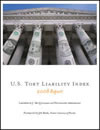Most people would rather listen to the buzzing of their alarm clocks than talk about tort reform.

The tort system refers to the overall legal system for compensating victims who suffer from accidental injuries. Lawsuits are filed most often for personal injury through class action lawsuits and personal claims.
Tort reform typically causes eyes to glaze over, but it’s an important issue that should be at the forefront of the current presidential debates. For some reason, though, tort reform has fallen through the cracks of discussion. Tort law needs to be changed.
In the United States, laws are usually set up so that each side in a lawsuit must pay their own legal fees, whether they win or lose (unless you’ve signed a contract that specifically says otherwise). This leaves the door open for greedy people to abuse the system by filing frivolous lawsuits in the hopes that they will get lucky and strike it rich.
In essence, those filing the lawsuits have nothing to lose, only cash to gain.
The defendant, on the other hand, must pay legal fees to defend him or herself, no matter how frivolous the lawsuit. If the defendant wins the lawsuit, what he or she really wins is a huge legal bill and an even bigger headache.
We’ve all heard stories about silly lawsuits that don’t have merit, such as the lawsuit filed against McDonald’s by a woman who spilled hot coffee on her lap.
Just this past week, a New Jersey couple’s son was struck in the chest with a line drive during a little league game. The couple is planning to sue the maker of the baseball bat, the sporting goods chain that sold the bat and Little League Baseball Organization for the injuries that Stephen suffered. Though you can sympathize with Stephen Domalewski and his family, the bat is not to blame for his injury. Such a lawsuit should never go to court.
Most frivolous lawsuits are settled out of court, often with huge payouts for the plaintiff as well as for the lawyer.
The reason for settling out of court is because legal fees often cost more than what the plaintiffs are suing for. In such cases, it makes more sense for the defendant to just settle on an amount determined by the plaintiff and his or her lawyers.
For example, imagine that Stephen and his family tried to sue the bat maker for $100,000. The bat maker’s legal costs could be more than several times that amount. Knowing that this is often the case, the plaintiff’s lawyer will “cut the plaintiff a deal” by asking for a $50,000 settlement instead of going through with court proceedings. The defendant still has to hand over a lot of cash in a settlement, but it costs a lot less than what it would cost to defend him or herself in court.
These cases, which happen far too often, are a blatant abuse of the U.S. legal system.
Sadly, the costs from these frivolous lawsuits are passed on to Americans and because of that, America’s civil justice system is the most expensive in the world.
A study by the Pacific Research Institute estimates the total annual cost of the tort system for U.S. businesses to be more than $865 billion. This amount is passed on to consumers in the form of higher priced products and services. Of course, the American taxpayer also pays for administrative expenses from litigation proceedings.
The threat of frivolous lawsuits has also forced many small businesses and doctor’s offices to close, leaving countless Americans without meaningful work and decreasing access to adequate medical care. Tom Cole, an Oklahoma representative, notes that “Small businesses rank the cost and availability of liability insurance as second only to the costs of health care as their top priority.”
Of course, there are legitimate accidents where an injured person should be compensated, but there should be stricter rules so that frivolous lawsuits don’t happen. Neighboring countries can give us a lesson on tort reform.
In virtually all other industrialized countries, people are careful to file lawsuits unless they are fairly certain that they will win. If a person files a suit and loses, he or she must pay his or her own legal fees as well as the defendant’s legal fees. Under this kind of law, the loser pays all. Such a system deters people from filing frivolous lawsuits. Unless there is a good chance that the plaintiff will win the case, he or she usually chooses not to follow through with the lawsuit.
In the past decade or so, tort has become a contentious political issue in the United States. Republicans have long supported tort reform, while Democrats have opposed it. In 2004, the House of Representatives voted on the Lawsuit Abuse Reduction Act, which helped reduce frivolous lawsuits by enforcing tougher sanctions and providing common sense protections.
Of course, such reforms aren’t about limiting the rights of accident victims.
As Rep. Cole puts it: “The purpose of tort reform is never to take away the right to sue or the rights of the plaintiff, but to put in to place a common sense, responsible civil justice system that will not drain our economy.”
This is a good first step to reform our tort system in this country. The best plan of action is to make plaintiffs accountable for all legal fees in the case of their defeat.
Until then, avoid hot coffee and baseball bats.
-Holly Foxen Wells is a business senior and a staff columnist.
-This column does not necessarily reflect the opinion of The Daily Aztec. Send e-mail to [email protected]. Anonymous letters will not be printed – include your full name, major and year in school.
